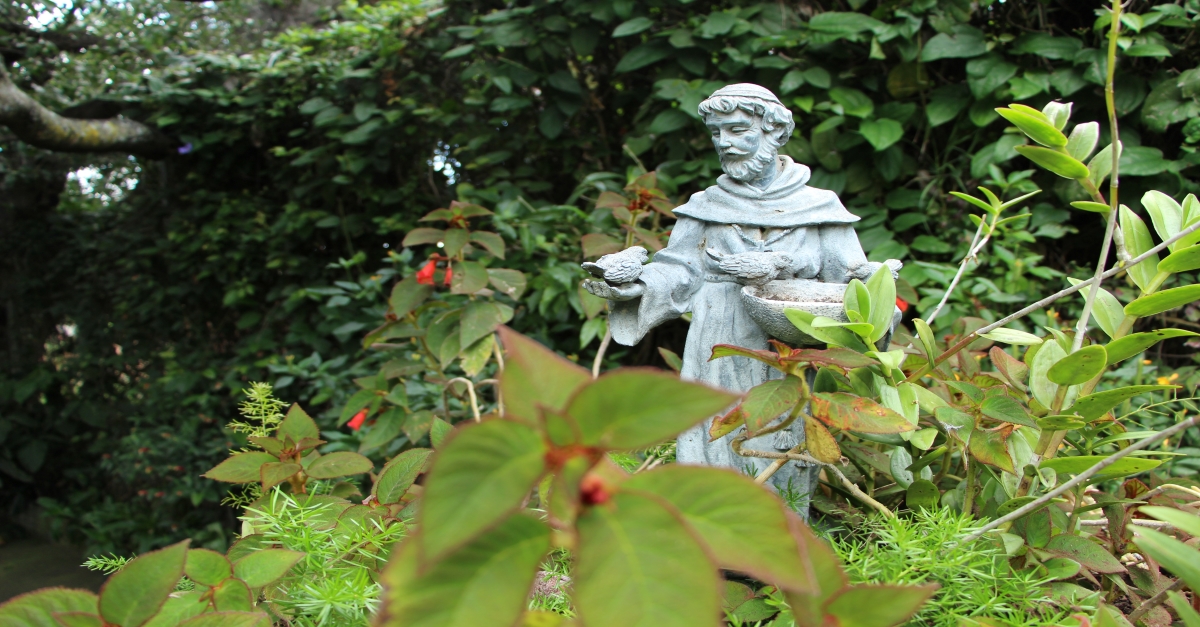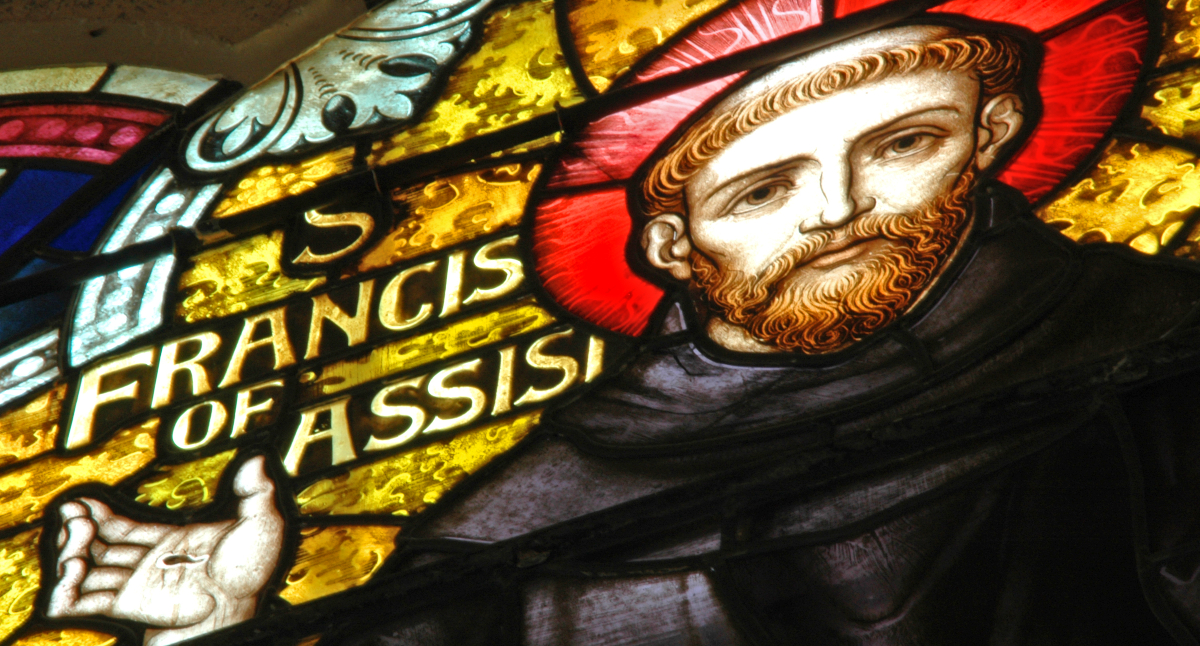You may have heard of Francis of Assisi—the celebrated saint, the historic friar whose love for animals makes him the perfect figurehead for birdbaths. You may also recognize his name as “an instrument of peace.” But the little-known facts about this humble man, who dared to take the Gospel literally, are guaranteed to draw us closer to the One he so adored.
5 Pivotal Events that Led to Francis of Assisi’s Call to Ministry

Photo Credit: Walt41/Getty Images
Francis was born into a wealthy family
Born in Assisi, Italy, in 1182, Francis grew up with every luxury a young man could want. Heir to his father’s vast wealth, he lived for pleasure and endeared himself to the elite community through his natural generosity, wit, and charm.
To learn the skills of the family textile trade, Francis often accompanied his father, Pietro Bernardone, on business trips to France. He fell in love with the French culture from an early age, especially the troubadours—a band of poetic entertainers who touted themes like chivalry, valiantly, and courtly love. Inspired by the troubadours, Francis developed an aspiration for knighthood.
Francis sought self-glory through military pursuits
When Francis was 20 years old, he seized the opportunity to fulfill his youthful dreams of glory by fighting in the battle between Assisi and Perugia. He was captured and held as a POW in a Perigean dungeon for a year before his father ransomed him. Upon his release, Francis suffered a severe illness. Still determined to make a name for himself, he responded to the Fourth Crusade’s call for knights before fully recovering.
Wearing newly acquired golden armor, Francis set out to join the war in Italy but relapsed into illness before reaching the battlefield. In his weakened state, Francis sensed God drawing him away from self-glory and the military life—and into service for God’s glory.
Francis Fell in Love with His Savior
Instead of going to war, Francis returned to Assisi and the mocking ridicule of family and friends. He dedicated himself to constant prayer to better understand God’s will for his life.
Fighting the urge to continue in the revelry of his former lifestyle, Francis spent countless hours in solitude and fasting. He so yearned for Christ that his friends teased that he “must be in love.” To their shock, Francis announced that he was indeed in love and “about to take a wife of surpassing fairness.” This declaration of adoration for God and the lifestyle he was called to marked the beginning of Francis’s holy surrender.
God would soon test Francis’s devotion by placing a leper in his path. Before his spiritual awakening, lepers repulsed Francis. But as he approached the man, the shame of his own prejudice overtook him. Filled with an unexplainable love for the beggar, Francis dismounted his horse, gave all his money to the leper, and kissed the man’s diseased hand.
This Holy-Spirit-led gesture of love ignited a new passion in Francis to offer everything he was and everything he owned to God—so that Christ’s love would flow through him unhindered.
His Family Disowned Francis
Francis again sought God’s guidance through prayer and scripture. Three times he sensed God telling him, “Francis, repair my Church, which has fallen into ruins.” Believing that God was guiding him to repair the dilapidated church at San Damiano structurally, Francis sold a sizable portion of his father’s textile stock, along with his own horse, to pay for the project.
When Francis’s father heard what his son had done, he beat the young man, dragged him before the bishop of Assisi, and demanded that Francis renounce his rights as Pietro’s heir and repay the money for the missing textiles.
The bishop told Francis to return the money and trust God. Francis willingly complied with the priest’s instructions and his father’s demands. “Pietro Bernardone is no longer my father. From now on I can say with complete freedom, ‘Our Father who art in heaven,” he said after removing his clothes and presenting them to Pietro.
Astounded by Francis’s Godly devotion, the bishop gave him a set of discarded clothes to cover his nakedness. Francis gratefully accepted the castoff garments and marveled at the honor of forfeiting his worldly gain for God’s glory.
Francis Joyfully Committed to a Life of Poverty
Francis returned to San Damiano and began to refurbish the chapel. As Francis labored to repair the church stone by stone, God began building the man into a servant-leader.
During the repair project, God made it clear that Francis’s ultimate mission would involve repairing spiritual breaches—by preaching repentance, proclaiming the Good News, and showing Christ’s love to all, without prejudice.
After hearing a sermon preached from Matthew’s Gospel, Francis knew he would undertake his Holy mission the way the Apostles had. He would “not get any gold or silver or copper to take with you in your belts—no bag for the journey or extra shirt or sandals or a staff, for the worker is worth his keep.” (Matthew 10:7, 9-11)
Francis accepted God’s call to ministry and poverty by saying, “This is what I wish; this is what I am seeking. This is what I want to do from the bottom of my heart.” He would later teach that his vow of external poverty was just an outward display of an inward call to total self-denial (Philippians 2:5-8).
5 Little Known Facts about Francis of Assisi’s Ministry

Photo: Getty/mstroz
Francis Rejected a Priestly Title and Embraced the Brand of “God’s Fool”
Although Francis was qualified for the priesthood and always respected and obeyed the Catholic church’s authority, he had no desire to bear the title of Priest. But without the church’s blessing, Francis ran the risk of being labeled a “heretic” for his unorthodox teaching.
In 1209, Francis and twelve of his followers journeyed to Rome to seek the approval of Pope Innocent III. His submission to papal authority, and a prophetic prompting given to the Pope in a dream, compelled the Catholic church to permit Francis to start the Franciscan order.
Francis traveled through villages preaching radically Biblical ideas about surrendered Godly living. Spiritually thirsty people came from everywhere to hear him preach. Francis and his followers ministered to the unreached masses with God’s Word always upon their lips. Legend says that Francis was so zealous for God that he preached the Good News even when only animals were available to listen. This earned him the title “God’s fool,” which he wholeheartedly embraced.
Francis Preached that One Could Have an Intimate Relationship with Christ
Francis was labeled a mystic because he saw God in everything and believed that Jesus’s prayer for “oneness” with the Father was attainable. “That all of them may be one, Father, just as you are in me and I am in you. May they also be in us so that the world may believe that you have sent me” (John 17:21). He found perfect peace by abiding in Christ and feasting on God’s Word as his nourishment, which was sometimes difficult for the religious community to comprehend.
The fruit of Francis’s incessant, and sometimes fanatical, communion with Christ was an outpouring of love and joy. As he called people to repentance and invited them to engage in a loving relationship with Christ, his simple invitation pierced hearts and often caused sinners to cry out to God. When asked about his power to cause transformation, Francis rejected the idea and insisted that he was simply the finger that pointed others to God.
Francis Believed the Lost Could be Reached Through Love and Truth
During the turbulent era of the Crusades, Francis formed his own revolutionary campaign to reclaim the world for Christ. He believed that wrath and judgment were instruments of purification that belonged to God alone—and that Christians were called to be instruments of peace.
Whereas the sword could extinguish a sinner’s worthless life, God’s Word could cut deep into hearts and create a channel of peace that led to eternal life. In 1219, while militant forces used Christ’s name to war against the Muslims, Francis risked his life by traveling to Egypt to talk with Sultan al-Malik al-Kamil. During their meeting, Francis respectfully shared his faith with the Muslim leader in such a compelling way that the Sultan granted him access to sacred Holy sites and requested that Francis “pray for him so that he would follow God more closely.”
Francis Erected the First Nativity Scene in 1223
Francis was so moved by the reality of Jesus’s sacrificial birth, earthly life, and death on the cross that he contemplated these loving acts constantly. He genuinely believed that if others could “Behold the Lamb of God, who takes away the sins of the world,” like Francis, they would be unable to resist the love of their Savior.
Out of his desire to show the world Jesus, Francis obtained permission from the church to create a Christmas display that would visually represent the setting of Christ’s humble birth. In a cave in Greccio, Italy, Francis set up the first nativity scene—complete with a real manger and a live ox and donkey.
When asked why he wished to create such a display, Francis replied, “I want to do something that will recall the memory of that Child who was born in Bethlehem, to see with bodily eyes the inconveniences of his infancy, how he lay in the manger, and how the ox and ass stood by.”
Francis Possessed Spiritual Insight to See God’s Praise in All of Nature
Francis’s renowned love and care for the environment and animals make him the most popular saint among nature-loving groups. But Francis was always transparent about why he enjoyed such an affinity with creation. He referred to every element in nature as his “brother” and “sister” because he recognized the fingerprints and majesty of Creator God in them.
Not only was Francis awestruck by God’s masterful design in creation, but he also had spiritual eyes to discern that the Almighty had equipped every living thing with a unique means to offer God praise. (Psalm 19:1, Psalm 66:4, Psalm 148:1-14, Revelation 5:13)
This incredible revelation thrilled Francis. The thought that he could join in symphonic union with all creation to praise God so overwhelmed the humble man, that he wrote the following prayer, which is still cherished today—eight hundred years after his passing:
The Canticle of Creation
O Most High, all-powerful, good Lord God,
to you belong praise, glory,
honor and all blessing.
Be praised, my Lord, for all your creation
and especially for our Brother Sun,
who brings us the day and the light;
he is strong and shines magnificently.
O Lord, we think of you when we look at him.
Be praised, my Lord, for Sister Moon,
and for the stars
which you have set shining and lovely
in the heavens.
Be praised, my Lord,
for our Brothers Wind and Air
and every kind of weather
by which you, Lord,
uphold life in all your creatures.
Be praised, my Lord, for Sister Water,
who is very useful to us,
and humble and precious and pure.
Be praised, my Lord, for Brother Fire,
through whom you give us light in the darkness:
he is bright and lively and strong.
Be praised, my Lord,
for Sister Earth, our Mother,
who nourishes us and sustains us,
bringing forth
fruits and vegetables of many kinds
and flowers of many colors.
Be praised, my Lord,
for those who forgive for love of you;
and for those
who bear sickness and weakness
in peace and patience
- you will grant them a crown.
Be praised, my Lord, for our Sister Death,
whom we must all face.
I praise and bless you, Lord,
and I give thanks to you,
and I will serve you in all humility.
Photo Credit: jdwfoto/Getty Images
This article is part of our People of Christianity catalog that features the stories, meaning, and significance of well-known people from the Bible and history. Here are some of the most popular articles for knowing important figures in Christianity:
How Did the Apostle Paul Die?
Who are the Nicolaitans in Revelation?
Who Was Deborah in the Bible?
Who Was Moses in the Bible?
King Solomon's Story in the Bible
Who Was Lot's Wife in the Bible?
Who Was Jezebel in the Bible?
Who Was the Prodigal Son?




